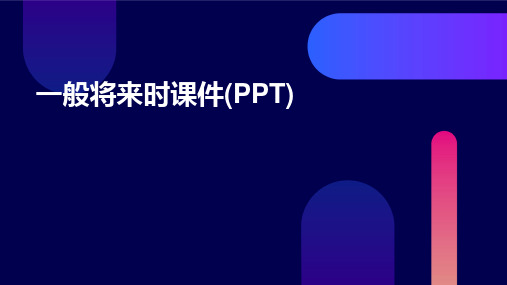初中英语一般将来时讲解(共26张PPT)
(完整版)一般将来时课件(PPT)

①
②
③
① Who will have an English party next week ?
② What will they have next week ?
③ When will they have an English party?
2. be going to 表将来
will 和be going to 的区别
回答:(肯)Yes,主语+will. (否)No,主语+won’t.
Yes,they will./No,they won’t.
They won’t(will not) have an English party next week.
注意:won’t=will not
(3).变特殊疑问句
They will have an English party next week.
他现在在北京。 He __i_s_ in Beijing now.(be)
他昨天在上海。
He w__a_s in Shanghai yesterday. (be) Hew_i_ll_be in Shanghai tomorrow. (be)
二、一般将来时的时间状语
1.与“tomorrow一家” 连用:
buy the oranges tomorrow?
2.Who _w_i_ll_i_n_ve_n_t (invent) a new
computer in 2050? 3.We _w_il_l _g_o (go) to the cinema next
Sunday. The film _w_il_l _b_e (be) very
6. He usually _g_e_t_s (get) up at 6 in the morning. Look! He i_s_g_e_t_t_in(gget) up now. But yesterday he _g_o_t_ (get) up very late, so he _w_e_n_t (go) to
(完整版)一般将来时课件(PPT)

2.与“next一家” 连用
next
time year week month term Monday at 7:00 next Sunday morning ……
2.He will find some meat in the fridge soon. (变一般疑问句) W __i_ll he _f_in_d _a_n_y_ meat in the fridge?
3.She will stay there in a week. (对划线部分提问) __H_o_w _s_o_on_ w_i_ll__ she _s_t_a_y_ there?
We will/shall go to Beingjing next week.
He will go to Beingjing next week
(2).变一般疑问句和否定句:
They will have an English party next week. Will they have an English party next week?
2. be going to+do可表示事先计划的意图,而 will 则表示说话人当时决定的意图;
We're going to drive you home after the meeting. Don't call a taxi. We'll drive you home.
I feel ill now, and I'll go to see the doctor. I'm going to see the doctor this evening.
一般将来时(精美课件)Will vs Be going to(共24张PPT )

谢谢
观看
A: Anna is in hospital. B: Yes, I know . I ____________ am going to visit her.
A: let's have a party!
B: That's a good idea! I will invite many friends
主观推测将来可能不发生根据现有情况推断区别22区别11作业写一篇用一般将来时的小作文内容不限字数不低于60词
Will vs Be going to
一般将来时
• 我们要了解:
be doing
does
• 我们要掌握:
be going to will
Will
vs
Be going to
?
PART 1
PART 2
• I will be 18 years old. • I'm going to be 18 years old. • I will be sick. • I'm going to be sick. • It will rain. • It is going to rain.
• I will be 18 years old. • I'm going to be 18 years old. • I will be sick. • I'm going to be sick. • It will rain. • It is going to rain.
A: Anna is in hospital. B: Yes, I know . I ____________ visit her.
区别1
• will:说话当时做决定(会,要)
一般将来时PPT课件

一般将来时的特殊用法和例句
Be going to结构
介绍be going to结构在一般将来时中的特殊用法。
表计划和打算
举例说明一般将来时推测的语境和例句。
一般将来时常见错误和建议
常见错误 建议
解释常见的一般将来时错误用法。
提供一些建议和技巧,帮助学习者正确运用一般 将来时。
标志词
列举一般将来时常用的标志词和词组。
一般将来时的肯定句
1
主语
介绍一般将来时肯定句的主语使用方法。
2
助动词
解释一般将来时肯定句中的助动词的用法。
3
动词
说明一般将来时肯定句中动词的形式和变化。
一般将来时的否定句和疑问句
否定句
描述一般将来时否定句的构成和特点。
疑问句
阐述一般将来时疑问句的组成和提问方式。
一般将来时PPT课件
本PPT介绍一般将来时的定义、用法、结构、标志词,以及肯定句、否定句、 疑问句的构成方法。同时包括特殊用法、常见错误和建议,最后总结要点。
一般将来时的定义和用法
定义
介绍一般将来时在英语中的含义和用法。
用法
解释一般将来时的常见应用场景和意义。
一般将来时的结构和标志词
句子结构
展示一般将来时的句子结构和基本构成要素。
总结和要点
1 总结
总结一般将来时的核心概念和用法要点。
2 注意事项
提醒学习者注意一般将来时使用中的常见错 误和问题。
一般将来时课件(PPT)

“be able to”表示将来有能力做某 事时,使用一般将来时形式,例如“I will be able to help you”。
情态动词如“can”、“may”、 “must”等,在一般将来时中通常直 接加动词原形,例如“I can swim”。
03
一般将来时在句子中的运用
陈述句中的使用
表示将要发生的动作或存在的状态
纠正方法
应使用正确的将来时形式,如 "He will go to the park tomorrow." 或 "He is going to the park tomorrow."
忽略动词变化规则
错误示例
They will play football in the future.(忽略了动词play在将来时中的变化)
纠正方法
在将来时中,应使用正确的助动词或情态动词形式,如 "I will be able to help you with your homework." 或 "I can help you with your homework."
错误示例
He will must finish his work before leaving.(错误地使 用了情态动词must)
作用
用于表示未来的计划、打算、预测、 假设等。
常见表达形式
will + 动词原形
表示将来的动作或状态,如“I will go to the park tomorrow.”(我明天将去公园。)
be going to + 动词原形
表示计划、打算或即将发生的动作,如“I am going to study hard this semester.”(我这 学期打算努力学习。)
初中英语一般将来时语法讲解 课件(共26张PPT)

PART 03
be going to +动词原形
1. 基本句型 (1) 肯定句:主语+be(am, is, are) going to +动词原形 +其他。 I’m going to see my friends this week.
(2)否定句:主语+be(am, is, are) not going to +动词原 形+其他。 I’m not going to see my friends this week.
2. 用法
(1)“be going to +动词原形”用于表示主观上打算将 来要做某事,这种打算往往是事先安排好的或表示可能 要发生或肯定要发生的事情。例如:
He’s going to learn English next term. I’m going to see her tomorrow.
(2)根据已有迹象,可能要发生的情况。如: Look at the black clouds! It is going to rain. (3)如果表示计划去某地,可以直接用be going to +地 点。 We are going to Beijing for a holiday. Jim is going to Shanghai by plane.
4.The boy ______ (go) to the middle school next year.
5. There _______ (be) a meeting next month.
2. 用法 (1)表示将要发生的动作或状态,常用的时间状语有: later, in the future, soon, from now on, tomorrow, in+一段 时间, next time/week/month/year等。
一般将来时PPT课件
•一般将来时基本概念•一般将来时结构与用法•一般将来时时间状语及标志词•一般将来时与其他时态对比•一般将来时在各类从句中运用•一般将来时误区及注意事项•总结回顾与拓展延伸目录01一般将来时基本概念定义与特点定义特点表现形式will + 动词原形be going to + 动词原形现在进行时表示将来预测未来计划与安排条件与假设030201使用场景02一般将来时结构与用法主语+ be not going to + 动词原形+ 其他成分主语+ be to not (非标准用法,尽量避免使用) + 动词原形+ 其他成分主语+ will not (won't) + 动词原形+ 其他成分Will + 主语+ 动词原形+ 其他成分?Be + 主语+ going to + 动词原形+ 其他成分?Be + 主语+ to + 动词原形+其他成分?(较少使用,多用于书面语)特殊疑问词动词原形特殊疑问词going to +成分?特殊疑问词to +(较少使用,多用于书面语)注意:在一般将来时的使用中,要注意区分不同语境和表达方式的细微差别,选择合适的结构进行表达。
同时,也要注意与其他时态的区分和联系,避免混淆使用。
特殊疑问句结构03一般将来时时间状语及标志词常见时间状语表示将来的时间状语表示计划或安排的时间状语标志词识别与运用04一般将来时与其他时态对比与现在进行时对比时间指向不同01动词形式差异02使用情境不同03时间基准差异动词形式变化使用情境区别时间范围不同动词形式区别使用情境差异05一般将来时在各类从句中运用在宾语从句中运用01 02定语从句的时态取决于它所修饰的先行词,如果先行词是将来时态,定语从句也使用将来时态。
如果先行词是过去将来时,定语从句则使用过去将来时。
定语从句中表示将来的时间状语有:tomorrow, next year, in the future 等。
06一般将来时误区及注意事项误区二过度使用“will”和“going to”。
一般将来时态讲解(共25张PPT)
• I don't think the test will be very difficult. 。
②用于“祈使句 + and + 陈述句” 中
I don’t think it will rain this afternoon.
I am hungry. I think I’ll have something to eat.
表示看法,观点
“There be”句型的一般将来时 肯定句: There will be +名词+其他成份 [注意]:无论后面加单数名词或复数形式,be都必须用原形。
shall适用于第一人称I,We;而will适用于所有人称。 通常可以用will来代替shall。 will,shall均可缩写为:'ll,如:
I will= I'll; she will = she’ll;will not 和shall not分别可以 缩写为 won't 和shan't。
1.一般将来时的用法
4. be about to + 动词原形。 表示 (1)“即将做”或“马上做”
(2)因此,句子不能再用时间状语。
Don’t leave. Li Lei is about to come. 不要走了,李蕾就要来了。 Be quiet. The concert is about to start. 安静下来,音乐演唱会就要开始了。
• My uncle will come to see me every Saturday.
• 我叔叔每个星期六都会来看我。
• The students will have five English classes per week this term.
一般将来时PPT课件
05
解析
含有will的句子改为否定句时 ,在will后加not,缩写为 won't。
06
THANKS
感谢观看
06
一般将来时练习题精选与解析
选择题精选与解析
01
题目:I _______ to the cinema. Will you go with me?
02
A. go B. am going C. have gone D. went
选择题精选与解析
答案:B
解析:由后一句“Will you go with me?”可知是打算去做某事,是一般将来时,所以用现 在进行时表将来,选B。
题目:— What _______ you _______ to do tomorrow?
选择题精选与解析
— I _______ visit my uncle. A. are; going; am going B. are; going; am going to
C. are; going to; am going D. are; going to; am going to
区别
现在进行时强调当前正在进行的动作 或状态,而一般将来时则强调未来将 要发生的动作或状态。
联系
两者都可用于表示将来的情况,但侧 重点不同。现在进行时通过现在正在 进行的动作暗示将来,而一般将来时 则直接表达将来的动作或状态。
与过去将来时的区别与联系
区别
过去将来时表示从过去某一时间 看将要发生的动作或状态,而一 般将来时则是从现在看将来要发 生的动作或状态。
表示将来经常发生的动作或习惯
常用的时间状语
always, often, usually等 。
句子结构
一般将来时(28张PPT)初中英语专项复习课件
v.欣赏,享受
No8.invite
v.邀请
turn系列
turn/on/off/up/down
“到达”系列 arrive in/at get to/reach
1.定义
一般将来时
将要发生的动作或者状态
➢ Demi will be 18 years old. ➢ It's cloudy.It is going to rain.
有will提will
有be提be
小结
一般将来时
一般将来时 6.特殊考点
there be句型与将来时
there will be there is/going to be
现在进行时表将来
come; go; arrive; leave; fly; land
• YOUR LOGO
附:一般将来时考点 思维导图
练一练
Is your isn't
going to visit
口诀2:有 be 提 be
练一练
B
练一练
D
There be与一般将来时
There be 句型 There is a party.
➢ sb. be going to do
There is going to be a party tomorrow.
汇报人:稻壳儿
练习
C B
A
THANK YOU
有be提be
5.句型转换
一般将来时
Demi will eat cakes tomorrow.
否定句: Demi will not eat cakes tomorrow.
=won’t 一般疑问句: Will Demi eat cakes tomorrow? 回答: 肯定回答:Yes, She will. 否定回答:No,She won't. 特殊疑问句:
- 1、下载文档前请自行甄别文档内容的完整性,平台不提供额外的编辑、内容补充、找答案等附加服务。
- 2、"仅部分预览"的文档,不可在线预览部分如存在完整性等问题,可反馈申请退款(可完整预览的文档不适用该条件!)。
- 3、如文档侵犯您的权益,请联系客服反馈,我们会尽快为您处理(人工客服工作时间:9:00-18:30)。
5.How _a_r_e__ you __g_o_in_g__t_o_ spend your holiday?
• — I’ve decided to repaint this room. — Oh, have you? What colour ___a_re you _g_o_i_n_g_t_o paint it?
He will do dull He won`t do
jobs.
dull jobs.
Will he do dull Yes, he will.
jobs?
No ,he won`t.
There will be a There won`t be Will there be a Yes,there will. computer in it. a computer in it. compuer in it. No,there won`t.
• They will take different routes to the same destination.(正在制定的计划)
• My uncle is going to visit us next month.(在一 个较近的未来将要发生的计划中的事)
• I think it’s going to rain.(有可能发生的事)
四、一般将来时在使用中的一些注意事项:
• 2、will/shall+do通常用来谈论未来会发生的
事或是正在制定的计划;而be going to +do通 常用来谈论在一个较近的未来将要发生的计划 中的或是有可能发生的事。如:
They will see us if we go out at the moment.(未来 会发生的事)
注定要发生的动作
The president is to speak on TV tonight.
官方计划或决定
4.be about to do 表示正要做…,马上要做... (不能与表示将来的时间的状语连用)
正要…突然发生… ❖ 英语晚会即将开始。 ❖ The English Evening Party is about to
注意:在口语中,所有人称都可以用will.
there be
❖ There (is going to) be a beautiful park.
❖
will
❖ There are going to be many beautiful parks.
祈使句+ and/or+将来时(will)
❖ 努力工作否则你就会失败。 ❖Work hard or you will fail(失败). ❖ 努力工作你就会成功。 ❖Work hard and you will succeed(成
• — The weather is so nice and I am going to sit in the garden.
— That’s a good idea. I ___w__il_l ___ join you.
Functional Practise:
1.Ihope that you__ a good time this eveniCng.
❖ 2、There are two cinemas in that town. (next year) ❖ 3、He comes back late. (in two days) ❖ 4、She is a conductor of a train. (soon) ❖ 5、Li Ming is ten years old. (next year) ❖ 6、I sometimes write to my mother in the evening. (tonight) ❖ 7、He went there by plane. (some day next year) ❖ 8、China is a modern and strong country. (in twenty years) ❖ 9、Do you study hard? (from now on) ❖ 10、She didn’t speak English at the meeting. (before long)
• When you get home, you’ll find a new bike in your garden.
The Future Simple Tense 句型
will 引导的一般将来时:表示将来发生的动作或存在的状态, 最基本的结构:will + 动词原形
“主谓(宾)句型”的一般将来时: 肯定句:主语+ will +动词原形+(宾语)+其他
❖ The evening class begins at 19:00.
❖ 火车两点出发.
❖ The train starts at two.
按括号内的提示,改写句子:
❖ 1、People in the north often go skating in winter. (next winter)
There will be only one country. 否定句:在will后面加not.
There won’t be only one country. 一般疑问句:把will提到there之前。
Will there be only one country? Yes, there will. / No, there won’t.
•
the coming +时间词 (Sunday,year…)
•
tonight
• this +afternoon, evening
• in +一段时间/未来 年代
• in the future
• after+时间词(5:
00pm)
四、一般将来时在使用中的一些注意事项:
1、will用于一切人称,shall只用于第一
一般将来时
一般将来时的意义:
• 用来描述一个即将要发生的动作; 谈论未来的计划和打算;表示将 来某一时刻的动作或状态。
二、一般将来时的基本结构:
will/shall+动词原形 I/we+shall be going to+动词原形 be not going to+动词原形
其他形式
1.be+to do 表示计划,责任,约定或命令
人称(I/we)。但现代英语倾向于所有人称 都使用will而不用shall,shall主要出现在 非常正式的英语场合中,或用于口语提 出建议或请求。如:
• Shall I go home now? (请求)
• Shall we meet at the school gate at 7:00 a.m.? (建议)
begin. ❖ 我正要出去,这时下起了雨. ❖ I was about to go out when it began to
rain.
6.表示与生日,日历,课时安排或交通时刻表有关的 动作(一种规律) ,用一般现在时表示将来时态
❖ 常用于转移动词如:
❖ begin, come , leave, go, arrive, start, stop, return, open, close…
Some day people will go to the moon . 否定句:在will 的后面加not即可。will not 可缩写为 won’t
They won’t use books . 一般疑问句:把will 提到句子主语之前,结尾变问号。
Will students go to school in the future ? 特殊疑问句:特殊疑问词+will +主语+动词原形+其他?
四、一般将来时在使用中的一些注意事项:
• 4、be going to do 用于表示计划、打算
去做某事(强调主观意愿);还可以表 示根据事实情况极有可能发生的事。如: • I’m going to take another plan.(计划) • It’s so cloudy. I think it’s going to rain. (根据事实极有可能发生)
四、一般将来时在使用中的一些注意事项:
• 6.在含有条件状语从句或时间状语从句
(if, when, as soon as 只要、一旦, until,
before, as long as等)的复合句中,从句 用一般现在时,主句用将来时,且用will
而不用be going to。如:
• Mum will go to Beijing if it doesn’t rain tomorrow.
They will do heavy work.
They won`t do Will they do heavy work. heavy work?
Yes,they will. No,they won`t.
“There be”句型的一般将来时 肯定句: There will be +名词+其他成份 [注意]:无论后面加单数名词或复数形式,be都必须用原形。
What will your dream school have ?
will句式总结:
肯定
否定
一般疑问 回答
I will have
I won`t have Will I have
Yes,I will.
many presents. many presents. many presents? No,I won`t.
功).
❖ 3.be to do
①表按计划或安排即将发生的动作 ②表示约定,责任,命令,或注定要发生的动作。 ③官方计划或决定(常见于报纸或广播)
He and I are to meet at the railway station
